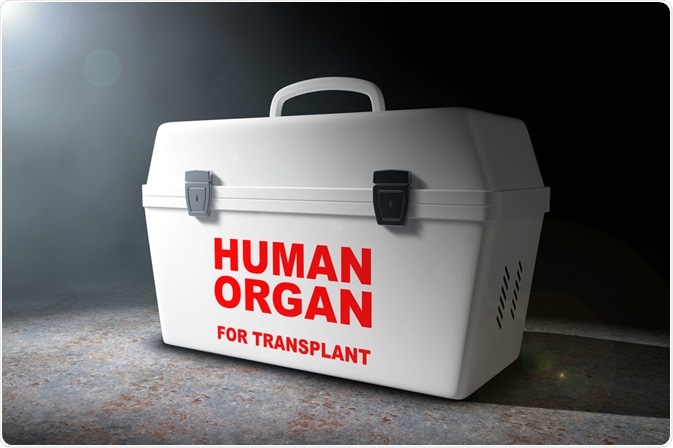Several surgical and medical barriers are encountered before completing a successful organ transplantation; however, the biggest biological hurdles during an organ transplant are considered to be immunological.

Organ Transplant. Image Credit: doomu/Shutterstock.com
Introduction
By definition, transplantation is the process by which cells, tissues, and/or organs are moved from one location to another, which can be within the same person or between a donor and recipient.
For most patients with end-stage organ failure, which can occur as a result of disease or injury to the organ, organ transplantation is considered to be their best option. In the year 2020, over 39,000 different organ transplants were performed in the United States, of which almost 23,000 involved the transplantation of the kidney.
The hierarchy of immunogenicity
First and foremost, it is important to recognize the hierarchy of immunogenicity that exists between organs. The transplantation of the small intestine, heart, lung, and kidneys in descending order, for example, require more intense immunosuppression regimens.
Comparatively, the transplantation of livers typically does not require the same level of immunosuppression treatment protocols. When rejection episodes do occur following a liver transplant, they are also relatively easier to treat as compared to when these situations arise with other types of organs.
The antigens involved in an alloimmune response
One of the most important factors that will determine a patient’s immune response against a transplanted organ is the degree of genetic similarity that exists between the donor and the recipient. If an organ transplant recipient’s immune system rejects an organ, an alloimmune response will occur.
The three types of tissue antigens that can be involved in invoking this immune response include ABO blood group antigens, human leukocyte antigen (HLA) antigens, and non-HLA antigens, which are otherwise known as minor histocompatibility antigens.
ABO blood group antigens
ABO blood group antigens are glycoproteins that are present on the surface of red blood cells (RBCs) in large amounts. To a lesser degree, ABO antigens can also be found on the surface of other types of tissues, the most predominant of which include the endothelium of vascular structures and the urothelium.
The presence or absence of specific antigens will determine an individual’s blood type, the four major blood groups of which include A, B, O, and AB. Individuals with both A and B antigens present on the surface of their RBCs, for example, will have Type AB blood, whereas individuals whose RBCs do not contain A nor B antigens will have Type O blood.
From childhood, the body will begin to develop antibodies against non-self ABO antigens that are otherwise referred to as anti-ABO antibodies which are capable of activating the complement cascade. Anti-ABO antibodies are naturally present throughout the body before the time of transplantation, unless a transplant was performed when the child was an infant.
Therefore, the transplantation of an organ that is ABO-incompatible, which otherwise signifies that the ABO antigens of the donor organ are different than those of the recipient, will immediately cause the complement system to activate. Hyperacute rejection of the organ will immediately follow, subsequently causing graft loss to occur in almost all organ types.
ABO-incompatible transplantation can have devastating effects; however, a simple and reliable assay is available to identify a patient’s blood groups, thereby eliminating any significant barrier that would affect a patient’s transplantation in this regard.
Note the presence of Rhesus antigens, which are represented as ‘positive’ or ‘negative’ after a patient’s ABO blood group, are not relevant in organ transplantation, as these antigens are only present on the surface of RBCs and not tissues. Any donor blood that might be present within the donor organ is flushed before implantation, thus further eliminating any potential for rejection that could occur due to differences in donor/recipient Rhesus antigens.
HLA antigens
As compared to ABO antigens, HLA antigens are major targets for an organ transplant recipient’s immune system. HLA antigens are proteins present on the surface of cells that play a role in presenting small portions of peptides to immune cell receptors.
HLA antigens are encoded by genes found in the major histocompatibility complex (MHC) region of the genome, of which HLA class I and class II antigens are encoded. Whereas HLA class I molecules present intracellular peptides, such as self-proteins or those derived from pathogenic substances, to CD8 T cells. Comparatively, HLA class II molecules present extracellular peptides, which were previously internalized by antigen-presenting cells (APCs), to CD4 helper T cells.
The diversity of HLA antigens extends beyond class I and class II HLA antigens, both of which can be further subdivided into subtypes. The major subtypes for the class I HLA antigens, for example, include HLA-A, HLA-B, and HLA-C antigens, which can be further classified by several hundreds of small variations in their geniting encoding alleles.
The diversity in HLA antigens is believed to be a beneficial evolution of the proteome, as it protects humans from all being susceptible to specific pathogens. While this may be true, the exposure of a donor transplant recipient to non-self HLA antigens can be highly immunogenic.
The role and impact of immunosuppressive medications
A combination of immunosuppressive drugs is often given to organ transplant patients to reduce the risk of organ rejection and prevent/reverse an alloimmune response. Immunosuppressive drugs are often given in two phases, the first of which is a high dose whereas the later maintenance phase will involve tapering the dose of immunosuppressives to lower levels.
The degree of immunosuppression that will be required often depends upon the type of organ being transplanted, as well as certain factors of the recipient, such as their age and history of previous transplant loss(es).
The four different types of immunosuppressants that can be prescribed following an organ transplant include induction antibodies, calcineurin inhibitors, anti-proliferatives, and corticosteroids, most of which act non-specifically and increase the susceptibility of organ recipients to opportunistic infections.
Further Reading
Last Updated: Mar 1, 2021